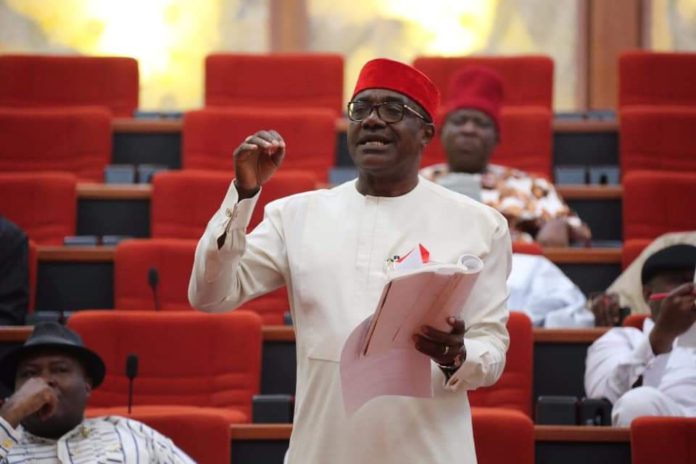President Muhammadu Buhari has assented to five bills, including the Extradition (Amendment) Act 2018, Federal Capital Territory Appropriation Act, 2018 and Nigerian Centre For Disease Control And Prevention (Establishment) Act, 2018.
The Senior Special Assistant to the President on National Assembly Matters (Senate), Ita Enang, disclosed this when he addressed State House correspondents in Abuja on Monday.
The presidential aide disclosed that the National Environmental Standard and Regulations Enforcement Agency (Establishment) (Amendment) Act 2018, and the Nigerian Institute of Mining and Geo-sciences, Jos, (Establishment) Act 2018, were also assented to by the president.
On the Extradition bill, Mr Enang said that the Act vested jurisdiction on extradition proceedings now on the Federal High Court and no more the Magistrates Court or Magistrates.
He explained that the amendment further introduced a new section 15(2) preventing double jeopardy as protected by Section 36(9) of the Constitution.
“The new section prevents a person surrendered to Nigeria in accordance with extraction treaty, obligation from being arrested, detained, extradited or otherwise dealt with in Nigeria or any other country within the Commonwealth or any other country having same extraditing agreement with Nigeria, if the proceedings relate to an offence for which he has been previously convicted or acquitted in the requesting country for which extradition is sought by the Nigerian authorities.’’
According to MR Enang, the Federal Capital Territory Appropriation Act 2018, allows aggregate capital and Recurrent Expenditure of N371,532,518,887 up to the financial year ending Dec. 31.
He said the Nigeria Centre for Disease Control and Prevention Act 2018 was aimed at promoting, coordinating and facilitating the prevention, detection and Control of Communicable diseases and other public health emergencies in Nigeria.
The Senator Representing Abia North Senatorial District Senator Mao Ohuabunwa was the Chairman of the Committee that worked on the Bill and ensure it was sent to the President for Assent.
Mr Enang said the Act, submitted by President Buhari as Executive Bill on Oct. 17, 2017 to the National Assembly, was to develop, maintain and coordinate surveillance systems to collect, analyse and interpret data on diseases of public health importance.
He said this was meant to detect public health threats, guide health intervention and set public health priorities and to lead the response to disease outbreaks, public health emergencies and disasters to minimise the impact on health.
He said the Act was also to develop and maintain a network of reference and specialised laboratories for pathogen detection, disease surveillance and outbreak response.
The presidential aide said it would also develop and maintain guidelines and processes for specimen collection and transportation to reference laboratories, including the World Health Organisation (WHO) standard reference laboratories in Nigeria.
“It would provide information to the public through multiple platforms on diseases and public health events and provide support and coordinate the control of national and trans-border responses to mass public health emergencies, such as mass casualties, floods, nuclear, biological and chemical terrorism, disease outbreaks and heavy metals poisoning, among others,’’ he added.
He said the National Environmental Standard and Regulations Enforcement Agency (Establishment) (Amendment) Act 2018, was an amendment to the 2007 Act.
According to him, the Act more succinctly defines matters of appointment to the council, empowers the Agency or appropriate person to cause immediate abatement of imminent environmental pollution while appropriate warrant or court order is sought to ensure public safety, among others.
He said the Nigerian Institute Of Mining and Geo-sciences, Jos (Establishment) Act “establishes the institute to provide courses of instruction, training and research in Geo-sciences and mining and produce technicians and such skilled personnel normally required for the mining and related industries.’’
He revealed that the law was to provide for “both the public and private sectors alike, laboratory services for rock and mineral identification, sampling and mineral beneficiation, mineral and metallurgical analysis
“It is also meant to Conduct research in mining, quarrying and related industries and to provide skilled training for the artisanal and small scale mining operators, among others.’’
(NAN)
